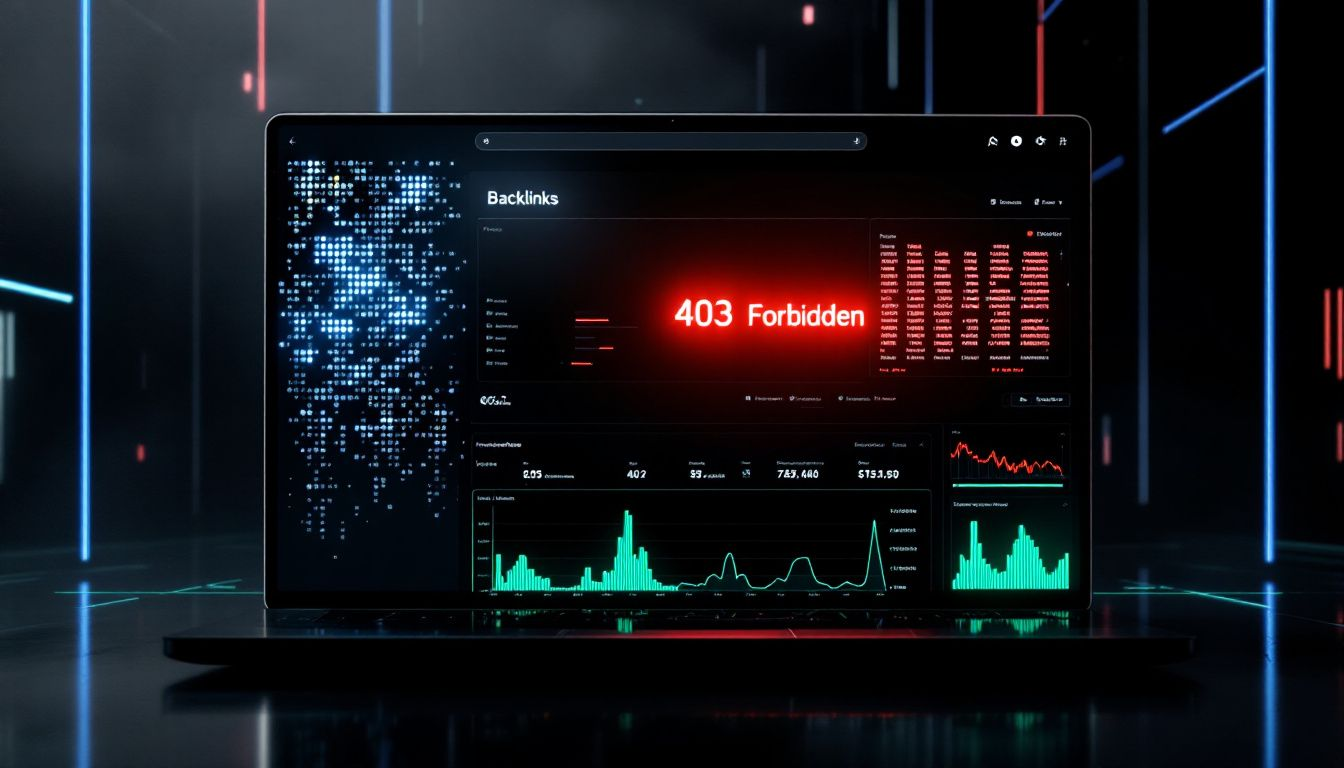Unnatural links are backlinks that violate Google’s guidelines and can lead to severe penalties for your website. If you’re experiencing a drop in search rankings or have received warnings, this article will help you understand what unnatural links are, how to identify them, and how to manage and remove them to protect your site’s reputation and visibility.
Key Takeaways
- Understanding unnatural links is crucial, as they can lead to significant SEO penalties and degrade user experience.
- Identifying and managing different types of unnatural links, such as paid links, link schemes, and PBNs, is essential for maintaining a healthy backlink profile.
- Proactive measures, including using tools like Google Search Console and disavowing harmful links, are key strategies for preventing and recovering from unnatural link penalties.
Understanding Unnatural Links

Links that appear to have no legitimate reason for being in content, commonly known as unnatural or spammy links, are types of backlinks strategically placed to circumvent the guidelines set by Google and unjustly inflate a site’s search rankings. Although they may initially seem beneficial, their enduring ramifications can be severely detrimental.
Ever since 2012, with the introduction of the Penguin Update, Google has enhanced its capacity to detect and sanction websites featuring such unnatural links. The search engine giant might neutralize these deceitful links without directly penalizing the site involved, stripping them of any value for SEO efforts. As a result, reliance on these dubious tactics could compromise user satisfaction while inflating bounce rates and diminishing engagement metrics.
It is critical not only to recognize but also understand how dramatically unnatural links can suppress your website’s online prominence. Accounting for over three-quarters of all SEO penalties imposed, such undesirable elements stand out in Google’s Search Quality Rater Guidelines as hallmarks of what constitutes the lowest quality web pages due primarily to their exploitative nature regarding search rankings manipulation—with paid sitewide links flagged specifically for undermining both user trust and credibility among search engines.
An informed perspective about what defines an unnatural link is foundational when aiming at vigilant management practices that fortify one’s backlink profile healthily—allowing you vigilantly sidestep potential pitfalls associated with these high-risk manipulative strategies while maintaining robust digital presence integrity.
Types of Unnatural Links

Various types of unnatural links exist, each crafted to artificially inflate search rankings and undermine the credibility of search engine results. Among these are paid links, link schemes, and private blog networks (PBNs). In contrast to such deceptive practices, a natural link is considered more authentic and valuable.
Link spam can be traced back to sources like low-quality directories or bookmarking websites as well as press releases that have been excessively optimized leading to awkward disruptions in the text flow. Tactics designed exclusively for manipulating backlinks include excessive link exchanges and intricate circular linking patterns. Both fall under the umbrella of link schemes. These methods pose risks, including potential sanctions from search engines.
It’s crucial to recognize various forms of unnatural links, including paid links, elaborate link schemes, and PBNs — understanding their mechanics is essential in realizing why they negatively impact search integrity.
Paid Links
Acquiring backlinks through financial transactions aims to enhance visibility and rankings. Utilizing such links is a common practice within black hat SEO strategies designed to influence search engine results unfairly. Nevertheless, this tactic does not align with the ethos of search engines like Google, which advocate for acquiring links naturally as an acknowledgment of content quality.
Proper management of paid links entails requesting their incorporation with a nofollow tag while making sure they are seamlessly integrated into the content itself. By doing so, it preserves the existence of the link but prevents it from contributing to PageRank calculations thereby reducing potential penalties. To conform with guidelines set by search engines, editing existing paid links for compliance may involve removing them or assigning them a nofollow attribute.
Being vigilant about how paid links are handled can prevent complications associated with unnatural linking patterns and helps maintain an upright profile regarding purchased backlinks in line with ethical SEO practices.
Link Schemes
Link schemes are defined as tactics aimed solely at manipulating links to boost search engine rankings, which can lead to penalties from search engines. These schemes often involve creating long lists of links to unrelated websites, excessive link exchanges, and the use of a link scheme.
Excessive link exchanges, in particular, are problematic as they involve trading links with other sites in a way that is unnatural and manipulative. Circular link schemes, where websites link to each other in a closed loop, are another form of unnatural linking behavior that should be removed or set to nofollow to comply with Google’s guidelines.
Avoiding link schemes is key to maintaining a healthy backlink profile and avoiding search engine penalties. Building natural links ensures your website’s long-term success.
Private Blog Networks (PBNs)
Search engine algorithms are often manipulated by the use of Private Blog Networks (PBNs), which are collections of websites owned by one party, engineered to create an artificial boost in SEO rankings through interlinked site structures. These networks fabricate a semblance of authority and relevance, aiming to deceive search engines into attributing higher value.
The deployment of PBNs incurs significant risk due to Google’s proficiency in detecting these scheming strategies. Engaging with PBNs can lead not only to substantial ranking declines but also possibly result in total de-indexation from Google’s listings once identified. The fleeting advantages provided by such networks do not compensate for the potential severe consequences they invite.
To avoid falling into traps laid out by such deceptive approaches as private blog networks (PBNs), it is vital to comprehend their design and inherent dangers fully. This knowledge empowers one to avoid unethical link-building tactics and concentrate instead on acquiring authentic, quality backlinks that ensure enduring success within search engine optimization realms.
How Google Detects and Penalizes Unnatural Links

Google utilizes advanced algorithms and hands-on assessments to spot and sanction links intended to artificially boost PageRank or manipulate a website’s rankings. Experiencing the effects of featuring unnatural links can be quite damaging, with possible outcomes including decreased rankings, reduced organic traffic, or even complete removal from Google’s search results.
Toxic links are essentially low-quality backlinks that can degrade a site’s standing and trustworthiness. Penalties for engaging in unnatural linking practices may arise due to manual interventions or automatic adjustments by Google’s algorithms, leading frequently to noticeable declines in a website’s ranking positions.
An understanding of how Google identifies and imposes penalties on unnatural linking is crucial for preserving an unblemished backlink profile. Let us delve into both manual actions taken by reviewers and algorithmic sanctions employed by Google to grasp their potential impacts fully.
Manual Actions
Google enforces its webmaster guidelines by administering manual actions for unnatural links, penalizing websites that engage in deceptive link-building techniques. These penalties are designed to cultivate genuine linking practices and purge spammy content from search results. A small number of these artificial or manipulative links can trigger such an action, adversely affecting a website’s visibility and visitor flow.
Upon the incidence of a manual action related to unnatural links, Google alerts the webmasters about the specific problematic backlinks at fault. Remedying this situation involves significant effort to either eliminate or disavow these detrimental connections, thereby reducing their quantity. To reclaim the site’s integrity, it is essential to undertake an exhaustive backlink audit geared toward weeding out poor-quality links.
Especially troublesome are paid self-promotional links which frequently provoke Google into imposing manual sanctions. Should a website be discovered harboring such illicit backlinks, it risks being subjected to comprehensive penalization—underscoring the necessity for compliance with principled SEO tactics. By dedicating efforts towards excising any spam-laden or subpar backlinks, you position yourself favorably for addressing a manual penalty head-on and steering your efforts towards having it revoked.
Algorithmic Penalties
Search engines, like Google Penguin, levy algorithmic penalties against websites that employ black-hat SEO methods to illegitimately elevate their search engine rankings. These sanctions are directed at identifying and devaluing manipulative links specifically, thereby diminishing their influence on the site’s placement in search results without applying a blanket penalty across the entire website.
By decreasing these links’ significance, Google allows unaffected sections of a website to preserve their standing in the search rankings. This strategy permits the rest of the site to continue achieving visibility in search results while only reducing the power of manipulative practices.
Understanding how these algorithmic penalties operate is crucial for steering clear of activities that could lead to such punitive measures. By committing to ethical SEO tactics instead, one can nurture a robust backlink profile and avoid detrimental effects on your site’s standing within search engine rankings.
Identifying Unnatural Links in Your Backlink Profile

Identifying unnatural links within your backlink profile is crucial for maintaining a robust SEO approach. These types of links, which don’t have contextual relevance and are used to unnaturally inflate search rankings, can originate from sources such as forum posts, guest blog postings, comment sections, or be generated by automated software. This results in an undesirable backlink profile.
Utilization of resources like Semrush, Ahrefs, and Majestic can assist in pinpointing detrimental links. It’s imperative to keep a vigilant eye on suspicious inbound links to ensure the integrity of your website’s backlink portfolio and its overall success online. By examining URL patterns with these analytical tools at hand allows you to manage your backlinks effectively.
Once harmful links have been detected, it is essential that steps are taken to reject those low-quality inbound connections and address their origins directly. Continual review of your site’s incoming link network—particularly following any decreases in web traffic—is key for upholding a pristine backlink profile thus safeguarding against potential sanctions from search engines.
Using Google Search Console
The Google Search Console tool is instrumental in spotting abnormal links within your backlink profile. Ensuring all website versions are incorporated into the search console allows for a comprehensive collection of backlink information, facilitating the effective monitoring and adjustment of your backlinks.
Notifications from Google about atypical links may appear in the Search Console messages to inform webmasters of problems requiring attention. These alerts often pertain to the identification of manipulative or unnatural links that do not conform to both Google’s guidelines for search results and its webmaster guidelines.
Utilizing Google Search Console aids in tracking your site’s backlinks while keeping you informed of potential issues. Swiftly responding to such notifications enables taking timely actions that help maintain an impeccable backlink profile, thus averting any penalties from Google.
Third-Party Tools
Utilizing tools such as Ahrefs and Majestic alongside Google Search Console can significantly enhance the efficiency of your backlink audit. These external platforms offer extensive details on your backlinks, allowing you to uncover potential problems that might negatively affect your site’s search engine ranking.
By integrating insights gathered from both third-party tools and Google Search Console, you can improve the thoroughness of addressing detrimental links during your audit. This integrative strategy ensures a comprehensive method for overseeing and improving your backlink landscape.
Consistently applying these resources to evaluate your backlinks positions you at an advantage in preempting possible complications, preserving a robust backlink profile, and steering clear of sanctions imposed by search engines.
Steps to Remove or Disavow Unnatural Links

Quick action is key in managing unnatural links. Assessing the value of a link and taking appropriate steps helps maintain a healthy backlink profile. If unnatural links can’t be improved, they should be removed or nofollowed.
Spammy links from blog posts, product pages, and spammy service sites should be removed or nofollowed to comply with search engine guidelines. If faced with a high number of spammy links, disavowing them is the best option to ensure Google trusts your site.
Next, we’ll discuss how to contact webmasters and use Google’s Disavow Tool to effectively manage unnatural links.
Contacting Webmasters
Reaching out to webmasters is an essential aspect of maintaining your backlink profile. When you initiate contact, ensure that you provide explicit details regarding the specific link in question by furnishing the URL and explaining why action is needed. A direct and succinct approach can enhance the likelihood of successful link removal.
In terms of dealing with unnatural links, consider asking webmasters to implement a nofollow attribute as part of managing your backlink profile effectively. This measure allows you to mitigate potential penalties while still retaining some value from those backlinks.
Effective communication that’s both clear and concise with webmasters plays a significant role in eliminating detrimental links, which contributes positively towards cultivating a robust backlink profile.
Using Google’s Disavow Tool
In situations where webmasters are either unreachable or unwilling to take down unnatural links, it becomes essential to utilize Google’s Disavow Tool. Compile a text document with each unwanted link on a separate line for the purpose of disavowment. Confirm that this disavow file is properly set up and uses UTF-8 or ASCII encoding.
This file serves as communication to Google, signaling which links should be disregarded during the evaluation of your website’s ranking. Once you have uploaded your list for disavowing purposes, expect that it might require several weeks before Google processes these modifications and they become evident within search results.
If removal requests fail, opting to disavow those stubborn links remains your optimum strategy. Employing the Disavow Tool can be instrumental in maintaining a clean backlink profile and safeguarding against possible penalties.
Preventing Unnatural Links
Ensuring that your site avoids unnatural links is critical for maintaining a robust backlink profile. Despite the challenges posed by spam, negative SEO, and suboptimal SEO strategies, which may be beyond our control at times, adhering to established best practices can aid in averting punitive actions.
Google’s advanced algorithms are adept at detecting dubious link-building techniques that contravene search engine guidelines. To safeguard against these unnatural linking methods, engaging with a reputable link-building agency is advisable.
It’s essential to oversee the outbound links from your website as part of managing unnatural inbound links effectively. Fostering natural links while keeping vigilant about incoming connections will contribute to sustaining a healthy backlink profile and circumvent potential penalties.
Building Natural Links
It is essential to cultivate natural links for the purpose of developing a robust backlink profile. Focus on crafting high-caliber websites and employing ethical SEO strategies. Seek out influencers, bloggers, resource listings, and digital forums as potential sources of pertinent and respected backlinks.
Be vigilant about managing outbound links from your domain, particularly those originating from guest authors or advertisers. This ensures the integrity of your link profile. Proper use of relevant anchor text can aid search engines in discerning the subject matter of linked pages, thereby boosting their relevance. To enhance SEO performance and diversify your link portfolio Rotate through various anchor texts while incorporating related keywords.
To steer clear of unnatural linking practices, it may be beneficial to engage with professional agencies that are both reputable and specialize in link building activities. Understand that paid links might manifest across different platforms such as sponsored blog entries, textual advertisements, banner ads or advertorials, these should always be appropriately identified to align with search engine guidelines.
Monitoring Inbound Links
Consistently keeping an eye on inbound links is crucial for preserving a robust backlink profile. Every few months, it’s wise to examine your backlinks and conduct comprehensive audits biannually to promptly identify any suspicious or spammy links.
Should you come across an unnatural link, think about applying the nofollow attribute or using information from Google Search Console as a guide for necessary actions. Staying proactive in monitoring inbound links enables you to catch and rectify potential problems swiftly, helping ensure that your site maintains its reputation with search engines.
Maintaining vigilance and performing routine audits are key strategies for sustaining a clean backlink profile while steering clear of the pitfalls associated with unnatural links.
How to Recover from an Unnatural Links Penalty
To bounce back from a penalty for unnatural links, it is crucial to take deliberate steps. Prior to putting in a reconsideration request, adhere to a detailed procedure that includes purging your site of dubious domains and tackling the foundational problems to lift the manual sanction.
Developing lasting methods aimed at regaining confidence with search engines necessitates ongoing adherence to principled SEO tactics paired with the creation of premium content. Such focused efforts are pivotal in re-establishing your website’s reputation and progressively elevating its position within search engine rankings.
We will delve into how one can successfully submit a reconsideration request as part of the journey towards restoring relations with search engines following an unnatural links penalty.
Submitting a Reconsideration Request
Prior to submitting a reconsideration request through the Google Search Console, it’s crucial that you rectify any problems responsible for incurring the penalty. This process should include addressing unnatural backlinks by either removing them or using a disavow file, which must be uploaded to the Search Console along with all links you wish to disavow.
In crafting your reconsideration request, make sure to provide an exhaustive account of corrective measures undertaken as well as supplying specific examples of links that have been taken down or included in your disavow list. The level of transparency and comprehensiveness within your plea is pivotal for enhancing the likelihood of getting the penalty annulled.
Bear in mind that processing a reconsideration request via search console may extend over several weeks. Sometimes up to half a year might pass before resolution is achieved. Should there be no response from Google about your submission after a two-month period, it would be advisable to seek information on their webmaster forum regarding its status. Experience suggests that resolving these issues typically requires between two and three attempts at filing reconsiderations requests before observing favorable outcomes.
Rebuilding Trust
To restore confidence with search engines following a penalty, it’s critical to show dedication to high standards. Recovering the site post-penalty requires eliminating or disavowing negative links and dedicating efforts towards crafting superior content. Upholding principled SEO strategies is crucial for reestablishing and keeping the trust of search engines.
Consistent compliance with guidelines set forth by search engines while concentrating on producing content that is both top-quality and pertinent can gradually repair your website’s reputation as well as enhance its position on search engine results pages (SERPs). This method paves the way for sustained achievement and safeguards against subsequent penalties.
Maintaining a robust backlink profile paired with commitment to ethical SEO principles are fundamental in establishing and maintaining credibility with various search engines.
Summary
Managing unnatural links and avoiding penalties is crucial for maintaining a healthy website and achieving long-term SEO success. Understanding what unnatural links are, identifying them in your backlink profile, and taking proactive measures to remove or disavow them can help protect your website from penalties.
Building natural links and regularly monitoring inbound links are essential strategies for preventing unnatural links and maintaining a healthy backlink profile. If you have been penalized, following the steps to recover and rebuild trust with search engines can help restore your website’s credibility and improve its rankings.
By focusing on ethical SEO practices and high-quality content, you can ensure your website remains in good standing with search engines and thrives in the competitive digital landscape.
Frequently Asked Questions
Can a website recover from an unnatural links penalty?
Yes, a website can recover from an unnatural links penalty by removing or disavowing the unnatural links and then submitting a reconsideration request to Google.
Taking these steps diligently can lead to a successful recovery.
What are the most common types of unnatural links?
The most common types of unnatural links are paid links, link schemes, and private blog networks (PBNs). These practices can lead to penalties from search engines, so it’s crucial to avoid them.
How does Google notify webmasters of unnatural links?
Google communicates with webmasters about the presence of unnatural links by sending alerts through messages within Google Search Console, emphasizing the problems that need to be addressed.
What steps should be taken before submitting a reconsideration request?
Prior to lodging a reconsideration request, it is imperative to address the factors that triggered the penalty. Actions like eradicating or disavowing unnatural backlinks should be completed, accompanied by a comprehensive account of what you’ve done to rectify these issues.
Essential for the effectiveness of your reconsideration is this meticulous groundwork and documentation of corrective steps taken.
How often should I monitor my inbound links?
It is recommended that you periodically review your inbound links every several months to ensure their general well-being and perform an in-depth analysis once a year to detect any spammy links.
Following this method assists in keeping a strong backlink profile.

